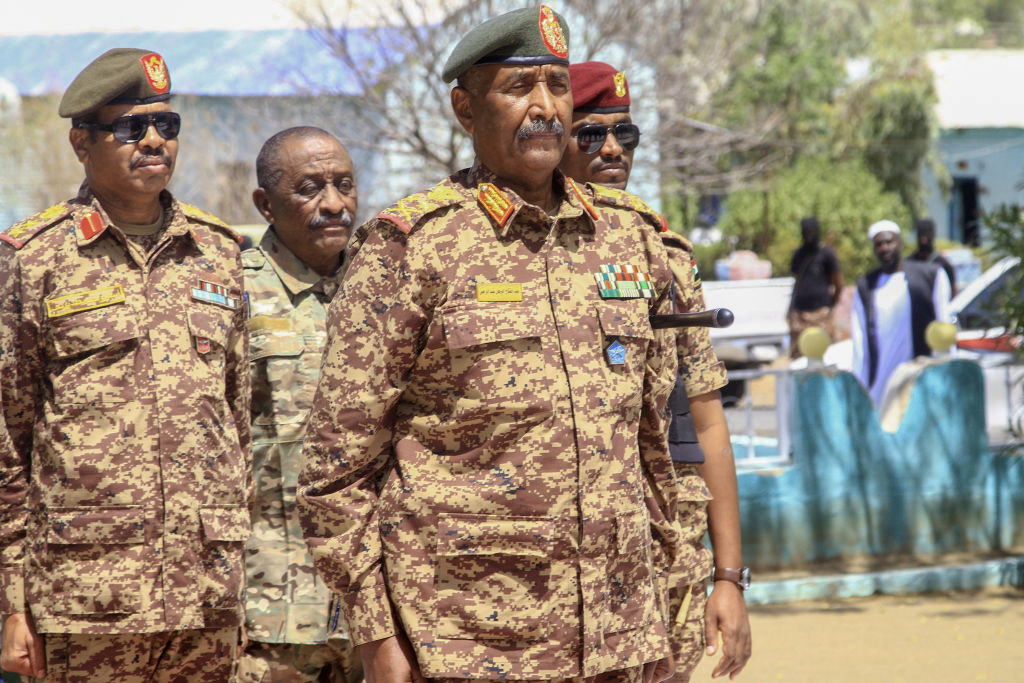Sudan's Hidden War: Muslim Brotherhood's Grip on Army Threatens Regional Stability, Global Trade
by Anna Mahjar-Barducci • September 10, 2025 at 5:00 am
Sudan's brutal civil war... is not just a clash between the Sudanese Armed Forces (SAF) and their former military allies turned rivals, the Rapid Support Forces (RSF). It is a calculated power grab by the Muslim Brotherhood, which appears to be using the SAF as a Trojan horse to dominate northeast Africa and the Red Sea, a critical artery for global commerce.
The Muslim Brotherhood, sponsored by Qatar, appears to be hijacking the SAF to stage a takeover, recycling old alliances under new guises. Despite recent concessions to the United States and Egypt, the Muslim Brotherhood's grip in Sudan -- backed by Qatar and Iran -- threatens regional and global stability, potentially including freedom of passage in the Red Sea.
[T]he Muslim Brotherhood — known in Sudan as the Islamic Movement — has entrenched itself in the SAF, and turned it into a tool for their regional ambitions to take control of northeast Africa and the Red Sea.
The Muslim Brotherhood is not just allied with the SAF; individuals in it seem to be steering the SAF to take total control of Sudan in order to make it the Muslim Brotherhood's stronghold in Africa and the Middle East.
The SAF is infiltrated by jihadist factions such as the Al-Bara Bin Malik Brigade (the Muslim Brotherhood's local military arm), the Bunyan Al-Marsous Brigade, and Justice and Equality Movement rebels led by Finance Minister Jibril Ibrahim. These groups, tied to Bashir's ruthless National Intelligence and Security Service, frame their fight as a "jihad" against the RSF, which is backed by the United Arab Emirates and Sudan's secular civil society.
Ali Ahmed Karti, the U.S.-sanctioned Islamic Movement leader, is, as reported by Arab media outlets, a key orchestrator of the SAF-Muslim Brotherhood alliance. Since his student days, Karti has organized Brotherhood loyalists in the army, and later packed the SAF with jihadists.
One analyst suggested that the five generals were dismissed after Burhan met with U.S. Special Envoy Mossad Boulos in Switzerland, on August 11, 2025. Researcher Mujahid Ahmed, however, warns that the Muslim Brotherhood's influence persists, extending into civilian institutions, especially the foreign affairs and justice ministries. According to the Ayin Network, Al-Burhan apparently still relies on Karti and Bashir's loyalist, Ahmed Haroun, for battlefield support, indicating a tactical, not total, break.
Iran has been supplying the Muslim Brotherhood-SAF axis with arms, including Ababil-3 and Mohajer-6 drones, which were delivered to Port Sudan in March and June 2024. Satellite imagery viewed by the BBC confirms their presence at a military site near Khartoum. Iran's support of this Muslim Brotherhood-SAF axis, tied to its ambitions to have a presence in the Red Sea, coincides with the Brotherhood's goals: namely, threatening U.S. allies such as Israel, Saudi Arabia and Egypt.
Burhan's "cosmetic" purge of Islamist generals shows that indeed he can be influenced by Egypt and by the United States, but his reliance on the Muslim Brotherhood's financial and military support limits his ability to implement any real reforms.
Sudan is evidently very much a part of the Muslim Brotherhood's global agenda. Ignoring events there will only allow a hostile stronghold to emerge in a region strategically vital for the interests of the West.

Sudan's brutal civil war, often overshadowed by global headlines, is not just a clash between the Sudanese Armed Forces (SAF) and their former military allies turned rivals, the Rapid Support Forces (RSF). It is a calculated power grab by the Muslim Brotherhood, which appears to be using the SAF as a Trojan horse to dominate northeast Africa and the Red Sea, a critical artery for global commerce.
Despite recent moves by SAF leader General Abdel Fattah Al-Burhan to curb Islamist influence, presumably at the request of the United States or Egypt, the efforts of the Muslim Brotherhood, which has deep roots in his army, to achieve control of Sudan, northeast Africa and the Red Sea, signal a dangerous threat that could disrupt oil supplies, inflate global prices, and revive Sudan as a terrorist hub, imperiling Western interests.

